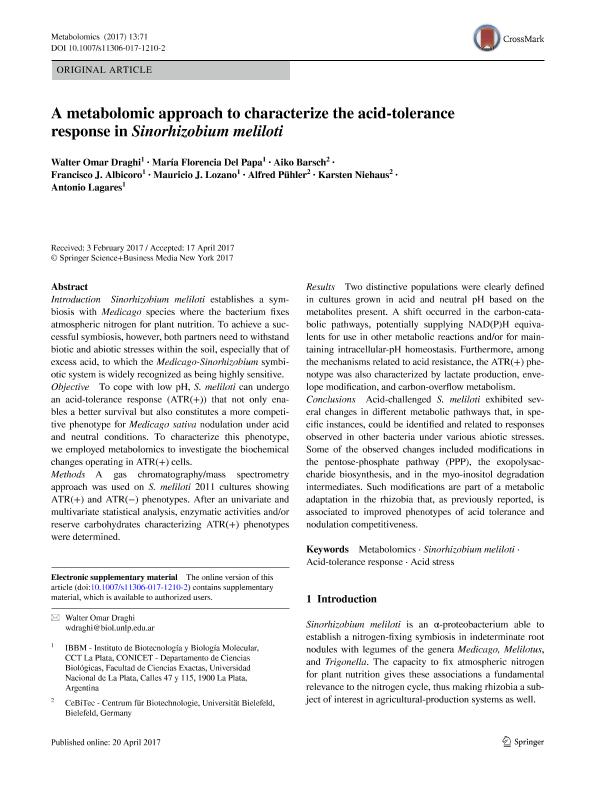Artículo
A metabolomic approach to characterize the acid-tolerance response in Sinorhizobium meliloti
Draghi, Walter Omar ; del Papa, Maria Florencia
; del Papa, Maria Florencia ; Barsch, Aiko; Albicoro, Francisco Javier
; Barsch, Aiko; Albicoro, Francisco Javier ; Lozano, Mauricio Javier
; Lozano, Mauricio Javier ; Pühler, Alfred; Niehaus, Karsten; Lagares, Antonio
; Pühler, Alfred; Niehaus, Karsten; Lagares, Antonio
 ; del Papa, Maria Florencia
; del Papa, Maria Florencia ; Barsch, Aiko; Albicoro, Francisco Javier
; Barsch, Aiko; Albicoro, Francisco Javier ; Lozano, Mauricio Javier
; Lozano, Mauricio Javier ; Pühler, Alfred; Niehaus, Karsten; Lagares, Antonio
; Pühler, Alfred; Niehaus, Karsten; Lagares, Antonio
Fecha de publicación:
06/2017
Editorial:
Springer
Revista:
Metabolomics
ISSN:
1573-3882
e-ISSN:
1573-3890
Idioma:
Inglés
Tipo de recurso:
Artículo publicado
Clasificación temática:
Resumen
Introduction: Sinorhizobium meliloti establishes a symbiosis with Medicago species where the bacterium fixes atmospheric nitrogen for plant nutrition. To achieve a successful symbiosis, however, both partners need to withstand biotic and abiotic stresses within the soil, especially that of excess acid, to which the Medicago-Sinorhizobium symbiotic system is widely recognized as being highly sensitive. Objective: To cope with low pH, S. meliloti can undergo an acid-tolerance response (ATR(+)) that not only enables a better survival but also constitutes a more competitive phenotype for Medicago sativa nodulation under acid and neutral conditions. To characterize this phenotype, we employed metabolomics to investigate the biochemical changes operating in ATR(+) cells. Methods: A gas chromatography/mass spectrometry approach was used on S. meliloti 2011 cultures showing ATR(+) and ATR(−) phenotypes. After an univariate and multivariate statistical analysis, enzymatic activities and/or reserve carbohydrates characterizing ATR(+) phenotypes were determined. Results: Two distinctive populations were clearly defined in cultures grown in acid and neutral pH based on the metabolites present. A shift occurred in the carbon-catabolic pathways, potentially supplying NAD(P)H equivalents for use in other metabolic reactions and/or for maintaining intracellular-pH homeostasis. Furthermore, among the mechanisms related to acid resistance, the ATR(+) phenotype was also characterized by lactate production, envelope modification, and carbon-overflow metabolism. Conclusions: Acid-challenged S. meliloti exhibited several changes in different metabolic pathways that, in specific instances, could be identified and related to responses observed in other bacteria under various abiotic stresses. Some of the observed changes included modifications in the pentose-phosphate pathway (PPP), the exopolysaccharide biosynthesis, and in the myo-inositol degradation intermediates. Such modifications are part of a metabolic adaptation in the rhizobia that, as previously reported, is associated to improved phenotypes of acid tolerance and nodulation competitiveness.
Palabras clave:
Metabolomics
,
Sinorhizobium Meliloti
,
Acid Tolerance Response
,
Acid Stress
Archivos asociados
Licencia
Identificadores
Colecciones
Articulos(IBBM)
Articulos de INST.DE BIOTECNOLOGIA Y BIOLOGIA MOLECULAR
Articulos de INST.DE BIOTECNOLOGIA Y BIOLOGIA MOLECULAR
Citación
Draghi, Walter Omar; del Papa, Maria Florencia; Barsch, Aiko; Albicoro, Francisco Javier; Lozano, Mauricio Javier; et al.; A metabolomic approach to characterize the acid-tolerance response in Sinorhizobium meliloti; Springer; Metabolomics; 13; 6; 6-2017
Compartir
Altmétricas



